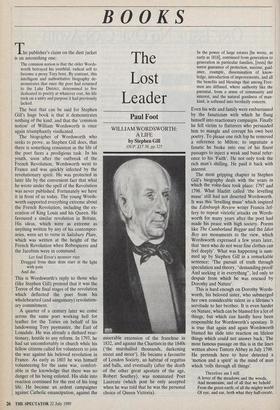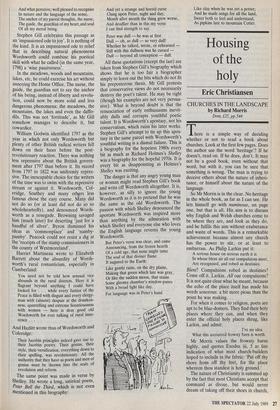BOOKS
The Lost Leader
Paul Foot
WILLIAM WORDSWORTH: A LIFE by Stephen Gill OUP, £17.50, pp.525 he publisher's claim on the dust jacket is an astonishing one:
The common notion is that the older Words- worth betrayed his youthful, radical self to become a prosy Tory bore. By contrast, this intelligent and authoritative biography de- monstrates that once the poet had returned to the Lake District, determined to live dedicated to poetry at whatever cost, his life took on a unity and purpose it had previously lacked.
The best that can be said for Stephen Gill's huge book is that it demonstrates nothing of the kind; and that the 'common notion' of William Wordsworth is once again triumphantly vindicated.
The biographer of Wordsworth who seeks to prove, as Stephen Gill does, that there is something consistent in the life of the poet faces a prodigious task. In his youth, soon after the outbreak of the French Revolution, Wordsworth went to France and was quickly infected by the revolutionary spirit. He was protected in later life by the convenient fact that what he wrote under the spell of the Revolution was never published. Fortunately we have it in front of us today. The young Words- worth supported everything extreme about the French Revolution, including the ex- ecution of King Louis and his Queen. He favoured a similar revolution in Britain. His ideas, which were as extreme as anything written by any of his contempor- aries, were set to verse in Salisbury Plain, which was written at the height of the French Revolution when Robespierre and the Jacobins were in command.
Let foul Error's monster race Dragged from their dens start at the light with pain And die.
This is Wordsworth's reply to those who (like Stephen Gill) pretend that it was the Terror of the final stages of the revolution which deflected the poet from his wholehearted (and sanguinary) revolution- ary commitment.
A quarter of a century later we come across the same poet working hell for leather for the Tories on behalf of his landowning Tory paymaster, the Earl of Lonsdale. He was already a diehard reac- tionary, hostile to any reform. In 1793, he had sat uncomfortably in church while his fellow citizens called for volunteers to join the war against his beloved revolution in. France. As early as 1803 he was himself volunteering for the same war, comfort- able in the knowledge that there was no danger of his being enlisted. His slide into reaction continued for the rest of his long life. He became an ardent campaigner against Catholic emancipation, against the miserable extension of the franchise in 1832, and against the Chartists in the 1840s (`the marshalled thousands, darkening street and moor'). He became a favourite of London Society, an habitue of regattas and balls, and eventually (after the death of the other great apostate of the age, Robert Southey), was nominated Poet Laureate (which post he only accepted when he was told that he was the personal choice of Queen Victoria). In the power of large estates [he wrote, as early as 1818], continued from generation to generation in particular families, [rests] the surest guarantee of protection, succour, guid- ance, example, dissemination of know- ledge, introduction of improvements, and all the benefits and blessings that among Free- men are diffused, where authority like the parental, from a sense of community and interest, and the natural goodness of man- kind, is softened into brotherly concern.
Even his wife and family were embarrassed by the fanaticism with which he flung himself into reactionary campaigns. Finally he fell victim to flatterers who persuaded him to mangle and corrupt his own best poetry. To please one rich fop he removed a reference to Milton; to ingratiate a fanatic he broke into one of his finest passages to inject a weak and banal refer- ence to his 'Faith'. He not only took the rich man's shilling. He paid it back with interest.
The most gripping chapter in Stephen Gill's biography deals with the years in which the volte-face took place: 1797 and 1798. What llazlitt called 'the levelling muse' still had not deserted Wordsworth. It was this 'levelling muse' which inspired the Edinburgh Review writer Francis Jef- fery to repeat vitriolic attacks on Words- worth for many years after the poet had made his peace with high society. Poems like The Cumberland Beggar and the Idiot Boy are monuments to the view, which Wordsworth expressed a few years later, that 'men who do not wear fine clothes can feel deeply'. What was happening is sum- med up by Stephen Gill in a remarkable sentence: 'The pursuit of truth through speculation and theory, "demanding proof/ And seeking it in everything", led only to despair from which he was rescued by Dorothy and Nature'.
This is hard enough on Dorothy Words- worth, his beloved sister, who submerged her own considerable talent in a lifetime's servitude to her brother. It is even harder on Nature, which can be blamed for a lot of things, but which can hardly have been responsible for Wordsworth's apostasy. It is true that again and again Wordsworth blamed his slide into reaction on lifeless things which could not answer back. The most famous passage on this is in the lines written above Tintern Abbey in July 1798. He pretends here to have detected a `motion and a spirit' in the mind of man which 'rolls through all things'.
Therefore am I still
A lover of the meadows and the woods, And mountains; and of all that we behold From the green earth; of all the mighty world Of eye, and ear, both what they half-create,
And what perceive; well pleased to recognise In nature and the language of the sense, The anchor of my purest thoughts, the nurse, The guide, the guardian of my heart,and soul Of all my moral being.
Stephen Gill celebrates this passage as an `impassioned ode to joy'. It is nothing of the kind. It is an impassioned ode to relief that in describing natural phenomena Wordsworth could combine his poetical skill with what he called (in the same year, 1798) a 'wise passiveness'.
In the meadows, woods and mountains, lakes, etc, he could exercise his art without annoying the Home Office. The nurse, the guide, the guardian not to say the anchor of his being, instead of liberty and revolu- tion, could now be more solid and less dangerous phenomena: the meadows, the mountains, the lakes and even the daffo- dils. This was not 'fortitude', as Mr Gill somehow manages to describe it, but cowardice.
William Godwin identified 1797 as the year in which not only Wordsworth but plenty of other British radical writers fell down on their faces before the post- revolutionary reaction. There was nothing less repressive about the British govern- ment after 1797 than before it. Its record from 1797 to 1822 was uniformly repres- sive. The inescapable choice for the writers of the time was to swim with the repressive stream or against it Wordsworth, Col- eridge, Southey and many others less famous chose the easy course. Many did not do so (or at least did not do so so wholeheartedly), and denounced Words- worth as a renegade. Browning savaged him (much later) for deserting 'just for a handful of silver'. Byron dismissed his ideas as 'commonplace' and 'namby- pamby'. Peacock could not resist a dig at the 'receipts of the stamp commissioners in the county of Westmoreland'.
Harriet Martineau wrote to Elizabeth Barrett about the absurdity of Words- worth's rural romanticism, especially in Cumberland:
You need not be told how sensual vice abounds in the rural districts. Here it is flagrant beyond anything I could have looked for . . . while every Justice of the Peace is filled with disgust and every clergy- man with (almost) despair at the drunken- ness, quarrelling and extreme licentiousness with women — here is dear good old Wordsworth for ever talking of rural inno- cence . . .
And Hazlitt wrote thus of Wordsworth and Coleridge:
Their Jacobin principles indeed gave rise to their Jacobin poetry. Their genius, their style, their versification, everything down to their spelling, was revolutionary. All the authority that they have as poets and men of genius must be thrown into the scale of revolution and reform.
The same point was made in verse by Shelley. He wrote a long, satirical poem, Peter Bell the Third, which is not even mentioned in this biography:
And yet a strange and horrid curse Clung upon Peter, night and day; Month after month the thing grew worse, And deadlier than in this my verse I can find strength to say.
Peter was dull — he was at first Dull — oh, so dull — so very dull!
Whether he talked, wrote, or rehearsed Still with this dullness was he cursed Dull — beyond all conception — dull.
All these quotations (except the last) are taken from Stephen Gill's biography which shows that he is too fair a biographer simply to leave out the bits which do not fit his preposterous thesis. Mr Gill protests that conservative views do not necessarily destroy the poet's talent. He may be right (though his examples are not very persua- sive). What is beyond doubt is that the renunciation of early enthusiasms inevit- ably dulls and corrupts youthful poetic talent. It is Wordsworth's apostasy, not his conservatism, which ruins his later works. Stephen Gill's attempt to tie up this apos- tasy in the same parcel with Wordsworth's youthful writing is a dismal failure. This is a biography for the hopeless 1980s every bit as much as Richard Holmes's Shelley was a biography for the hopeful 1970s. It is every bit as disappointing as Holmes's Shelley was exciting.
The danger is that any angry young man or woman might read Stephen Gill's book and write off Wordsworth altogether. It is, however, as silly to ignore the young Wordsworth as it is to pretend that he was the same as the old Wordsworth. The passion with which Shelley denounced the apostate Wordsworth was inspired more than anything by the admiration with which Shelley and everyone else who loves the English language reveres the young Wordsworth.
But Peter's verse was clear, and came Announcing, from the frozen hearth Of a cold age, that none might tame The soul of that diviner flame It augured to the Earth: Like gentle rains, on the dry plains, Making that green which late was gray, Or like the sudden moon, that stains Some gloomy chamber's window-panes With a broad light like day.
For language was in Peter's hand Like clay when he was yet a potter; And he made songs for all the land, Sweet both to feel and understand, As pipkins late to mountain Cotter.



















































 Previous page
Previous page